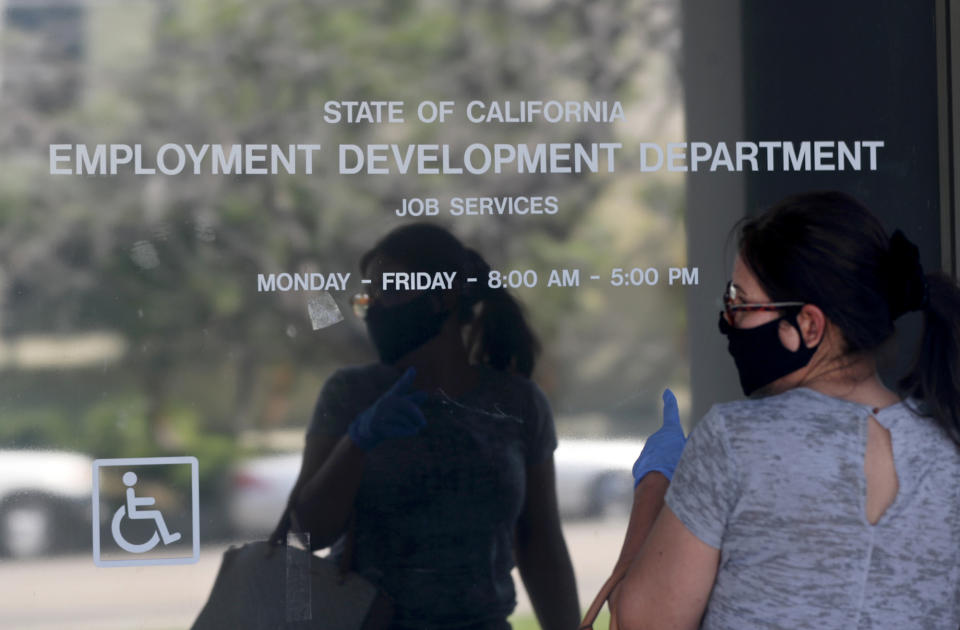Fraudsters may be stealing $26 billion in bogus coronavirus unemployment claims
Fraudsters are increasingly targeting American workers’ unemployment insurance, government officials and nonprofits warn, lured by the generous benefits the federal government is doling out because of the pandemic.
The heightened scam activity only adds to the complications for the many jobless workers who have reportedly waited weeks due to backlogs before getting their benefits.
Approximately $26 billion of unemployment benefits could be wasted with a large portion of this going to fraudsters, according to Scott Dahl, the inspector general for the Department of Labor. Over the last three months, more than 44 million Americans have filed jobless claims.
Read more: How to file for unemployment insurance
“About 10% of unemployment insurance payments are improper in the best of times,” Dahl told the House Subcommittee on Government Operations on June 4. “With the large amount of funding under the CARES Act, the improper payment rate potentially will be much higher.”
Under the $2.2 trillion relief package called the CARES Act, laid-off and some furloughed workers got an extra $600 a week in benefits on top of what they received from the state if their job loss was a result of the coronavirus and the subsequent shutdowns.

‘The order of magnitude is not what we expected’
The state of Washington estimates that between $550 million and $650 million of the state’s unemployment benefits have been stolen through fraudulent claims. Around $330 million have been recovered as of June 4, according to the state’s Employment Security Department.
“We started to get a number of calls, specifically from the Seattle area, and that's unusual for us because we don't get very many complaints and questions around unemployment benefits,” said James Lee, chief operating officer of the Identity Theft Resource Center, a nonprofit that helps victims of ID theft. “In a typical year, we would only see 10. When the unemployment payments started, we had 44 in three days.”
Read more: Workers rights: Here's how the new coronavirus legislation protects you
Unemployment benefits fraud typically isn’t as common as other identity theft scams because it’s often not worth the time and effort for the fraudsters, Lee said. But the additional $600 per week means higher yields for scammers.
“The order of magnitude is not what we expected,” Lee said. “We knew we would see an increase because any time there is an event that affects the economy broadly, fraud always goes up. But this is an increase of an exponential rate.”
‘You may only find out when the IRS comes knocking’
In these types of scams, fraudsters steal someone’s Social Security number and file an employment claim under their identities.
In some of the reports the Identity Theft Resource Center received, people lost $5,000 to $7,000 worth of unemployment benefits. It can take weeks or months for an investigation to be conducted and for the state to recover the money. That means unemployed workers have to wait additional weeks or months for their first payment, if they were a victim of fraud.

“In any case, it's going to be another series of weeks or months delay to get that cleaned up before you can actually get your benefits,” Lee said. “To an individual who's waiting on an unemployment benefit check, that's a huge financial issue.”
Often victims of unemployment scams only realize what’s happened when they must apply for benefits. Fraudsters prefer to use the personal information of people who haven’t applied for unemployment benefits, because that’s when they’re able to get them. Their victims may not realize what happened until the federal government tries to collect taxes.
Read more: Coronavirus stimulus check scams: How to avoid becoming a victim
“It's taxable income,” Lee said about unemployment benefits. “So you may only find out when the IRS comes knocking several years from now.”
Additionally, such fraud could impact the amount of unemployment you receive in future unemployment insurance benefits applications, Lee said.
‘One passphrase, one account’
If you already have an account set up with the state, make sure the information hasn’t been changed and that you have a secure password. If two-factor authentication is an option, use it by putting your phone number or email address as the second identifier.
“Don't do a password. Do a passphrase and make it something [you can] remember,” Lee said. “Make sure you don't use that phrase, anywhere else. One passphrase, one account.”
Monitoring your credit is also a good way of catching early on if you’ve been a victim of identity fraud. If you see a new account opened under your name that you didn’t authorize, that’s a good indication that someone has your personal data and could use it to apply for unemployment benefits.
Reporting the scam as early as possible provides a higher chance of stopping the criminals. If you find yourself a victim of an unemployment benefits scam, report it to your state department and local law enforcement office.
Denitsa is a writer for Yahoo Finance and Cashay, a new personal finance website. Follow her on Twitter @denitsa_tsekova.
Read more:
Here's why the US still has one of the highest jobless rates among developed countries
Read more personal finance information, news, and tips on Cashay
Follow Yahoo Finance on Twitter, Facebook, Instagram, Flipboard, SmartNews, LinkedIn, YouTube, and Reddit.

 money
money 

